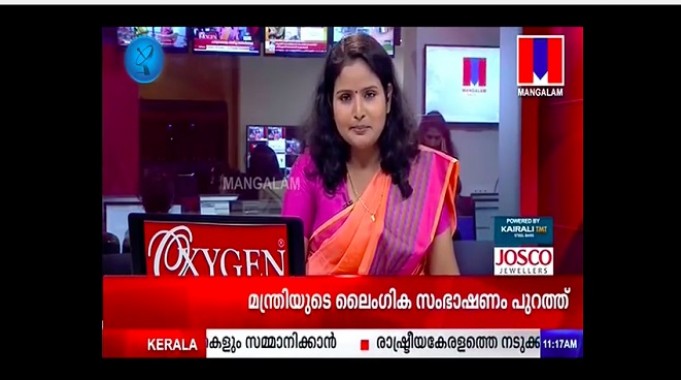Mangalam TV, the Minister, and media ethics
The story airs on Mangalam TV
In a more advanced information age the public and private sphere became amalgamated and thus the public exploitation of the private life has become an unwritten norm. Striking a balance between free speech and right to privacy has always been a controversial tenet in Indian social discourse too. Now, an ‘exclusive news’ of a new Malayalam channel has kicked off a debate of this kind following the broadcast of an lewd phone call of the state Transport Minister A K Saseendran.
Mangalam TV, a Malayalam news channel started their broadcasting arguably with an ‘earth shaking’ news where they aired an ‘lewd phone call’ allegedly of a state minister to a lady. The news anchor presented the story with a cautionary warning saying that “don’t let your children to watch this news as it explicitly carries sexual content”. The channel broadcasted an audio clip of the phone call where a man (allegedly the minister) was found speaking in sexually explicit manner. But leaving a spark of doubt pertaining to the consensus of the woman, the channel has made some editing on the audio clip to mute the other end (lady) of the phone call.
Though the channel argued that the minister has misused his power to take advantage of the woman who was indeed seeking help from the minister, they failed to reveal whether the lady has a complaint against the minister or not. The audio clip has also raised the question of privacy as the phone call seemed to be a consensual one. However, the minister resigned soon after the broadcast saying that “I have decided to resign. But it should not be seen as the acceptance of my guilt. I appeal the chief minister to probe the allegations against me. But it is my responsibility to step down to protect the value of my party and front”.
Following these incidents, a serious discourse on right to privacy has started evolving around basic journalistic ethics. Interestingly, the debate was initiated by the media itself as many leading media professionals came publicly to say that the broadcast by Mangalam TV was a criminal act.
Pramod Raman, the Co-coordinating Editor of Manorama News and one of the pioneering figures among Malayalam news anchors puts on Facebook that the Mangalam TV broadcast was an apparent deviation from journalistic ethics and it is nothing other than throwing filth on people’s face.
Echoing Pramod Raman’s opinion, Manila C Mohan, the copy editor of Mathrubhumi Weekly demanded an action against Mangalam TV for broadcasting criminal content in pursuit of Journalism.
Saneesh Elayadath, Senior News Editor of News 18 Keralam, Harshan Poopparakkaran, News Editor of Mathrubhumi News, and several other working journalists of different media organisations criticized the broadcast of Mangalam TV for airing a highly obscene audio clip without revealing whether there is complainant in the incident or not. Following the discourse that was initiated by media professionals, the public also engaged in the same,ranging themselves for and against the act of Mangalam TV.
The major question that arises here in this case is as simple as this: when there is no complainant in the alleged case (Till today nobody has given a complaint against the minister and the channel also maintains silence on this question) and the audio clip itself indicate that the conversation would be a consensual one in a private space, what is the point in making it public and what public interest angle does that story have? If that conversation happened in a private space, can the man be expected to speak in parliamentary language?
The question about the lady at the other end of the phone call still remains as ambiguous. If the lady was pushed to such an embarrassing situation over the inappropriate use of ministerial power as the channel claimed,, why the channel keep silence when they were asked about the complaint of the victim? The criminal silence of the channel authority to this question points to possibility of an unauthorized phone call leaking or honey trap for the publicity of the new channel.
However this cannot be perceived as an isolated incident in Kerala. We could say that Mangalm TV was serving content to the Kerala public that there is a demand for. Unnecessary and criminal intrusion into others’ personal life has becomea common in the state these days. ‘Moral policing’ in Kochi, Kollam and Thiruvananthapuram have revealed the liberal falsehood of the literary state. While the moral policing incident in Kollam claimed the life of a young 24 year old man, the incident in Thiruvananthapuram came to the public through the Facebook live streaming by the victims.
In a pseudo-liberal society where people are more concerned about what will happen when a girl and boy sit together, a bedroom conversation is obviously the most appropriate story to start with.
Rajeesh Kumar T V is a UGC MRP Research Fellow at the Dept.of Electronic Media & Mass Communication, Pondicherry University.
Email: rajeeshkumar.t.v@gmail.com







